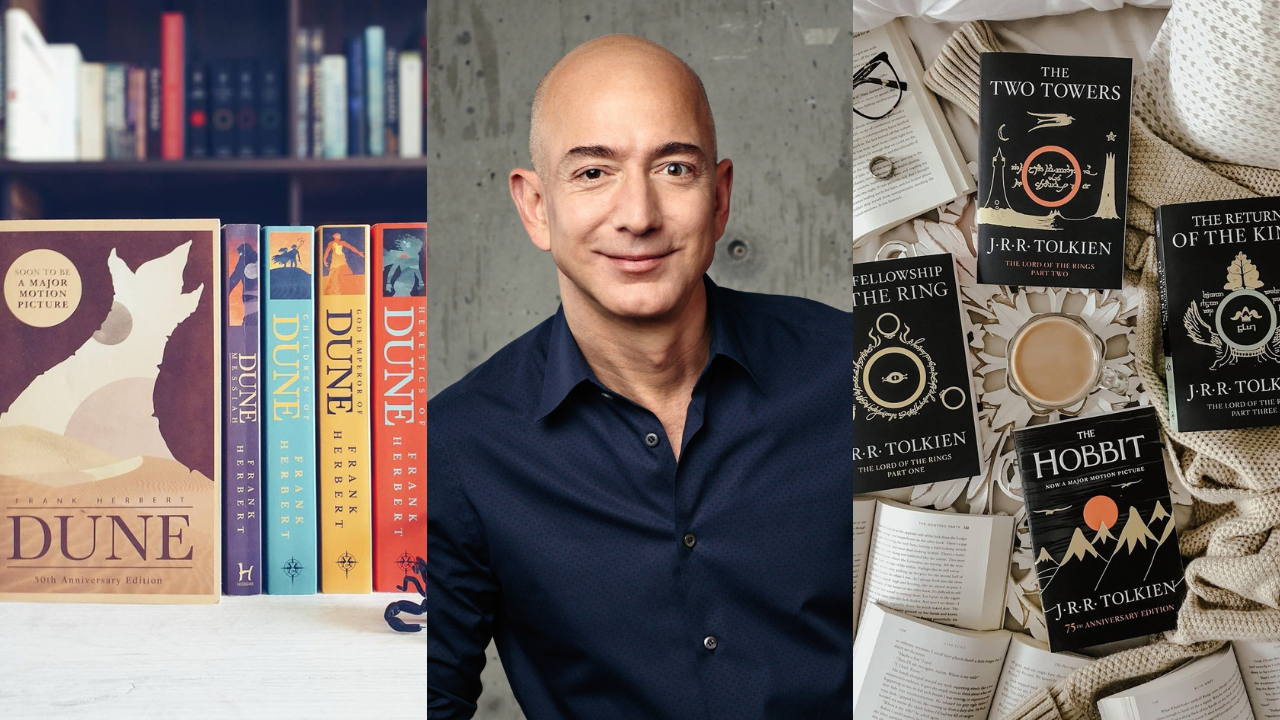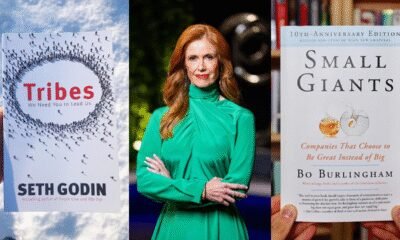Ethics & Policy
20 Best Books Recommended by Amazon Founder Jeff Bezos That Will Change Your Life.

20 Life-Changing Books Recommended by Amazon Founder Jeff Bezos (Picture Credit – Instagram and IMDB)
Jeff Bezos, the founder of Amazon and one of the most influential figures in the tech industry, has often shared his love for reading. Books have not only helped shape Bezos’s professional decisions but also provided him with a deeper understanding of the world and his place in it. Here’s a glimpse into 20 life-changing books recommended by Bezos himself, which range from novels to business manuals, reflecting the breadth of his interests and the depth of his intellectual curiosity.
1. The Lord of the Rings by J.R.R. Tolkien
An epic that goes beyond mere adventure, delving into themes of courage, friendship, and the eternal battle against darkness. Jeff Bezos admires it for its lessons on perseverance and the significance of viewing life with a long-term lens, principles he applies in his ventures.
2. Dune Series by Frank Herbert
A seminal work in science fiction, the Dune series weaves complex narratives around politics, religion, and power. Its exploration of resource scarcity and the necessity for innovation deeply influences Bezos’s thoughts on business and the future.
3. Culture Series by Iain M. Banks
This collection of space operas examines societal norms, ethics, and technology’s role in shaping civilizations. It mirrors Bezos’s passion for space and his vision for humanity’s future, reflecting his broader interests and futuristic outlook.
4. The Remains of the Day by Kazuo Ishiguro
A contemplative narrative about dignity, professionalism, and the opportunities we miss in the quest for greatness. Bezos values its introspective look at balancing ambition with personal happiness, a theme resonant in his leadership philosophy.
5. Creation: Life and How to Make It by Steve Grand
Steve Grand challenges conventional notions about life and its artificial creation, aligning with Bezos’s intrigue for pushing the boundaries of technology and innovation. It’s a thought-provoking read that fuels his interest in the potential of artificial intelligence and life sciences.
6. The Black Swan by Nassim Nicholas Taleb
Nassim Nicholas Taleb’s examination of unpredictability and the human inclination towards oversimplification informs Bezos’s approach to risk and strategy. This book underscores the importance of preparing for the unforeseeable, a concept integral to Amazon’s success.
7. Good to Great by Jim Collins
Jim Collins outlines what differentiates merely good companies from great ones, emphasizing disciplined people and strategic thinking. Bezos aligns with this philosophy, prioritizing customer-centric practices and visionary leadership to elevate Amazon from good to great.
8. Built to Last by Jim Collins and Jerry I. Porras
Exploring the traits of enduring companies, this book complements Bezos’s ambition for Amazon to be a timeless institution. It underscores the value of visionary goals and adaptable strategies, principles Bezos champions.
9. The Effective Executive by Peter F. Drucker
Peter F. Drucker’s insights on productivity and impactful decision-making resonate with Bezos. Emphasizing effectiveness over efficiency is a guide Bezos uses to navigate leadership challenges, focusing on impactful actions that align with long-term goals.
10. The Player of Games by Iain Banks
‘The Player of Games’ by Iain M. Banks delves into the strategic mind of Jernau Morat Gurgeh, a master game player in the Culture universe. Tasked with infiltrating a deeply competitive society, Gurgeh’s journey explores themes of competition, strategy, and what it means to truly master a game. Banks weaves a narrative that’s both a thrilling adventure and a profound commentary on the nature of play and power.
11. The Goal: A Process of Ongoing Improvement by Eliyahu M Goldratt and Jeff Cox
This novel translates complex manufacturing concepts into an accessible narrative, emphasizing efficiency and continuous improvement. Bezos applies its lessons on identifying and solving bottlenecks to enhance Amazon’s operational flow, showcasing the power of focused problem-solving in business.
12. Data-Driven Marketing by Mark Jeffery
Jeffery’s deep dive into leveraging data for marketing echoes Amazon’s strategy of using customer insights to drive decisions. It reinforces the belief that understanding and acting on data can significantly improve marketing effectiveness, a principle Bezos champions at Amazon.
13. Lean Thinking by James P. Womack and Daniel T. Jones
This book advocates for maximizing value while minimizing waste, principles that have become foundational to Amazon’s approach to business. Bezos credits its philosophy to Amazon’s emphasis on efficiency and relentless pursuit of delivering customer value.
14. Memos from the Chairman by Alan C. Greenberg
Greenberg’s collection of insightful memos provides timeless wisdom on leadership and culture. Bezos finds inspiration in its straightforward leadership advice, mirroring these lessons in Amazon’s innovative and customer-centric corporate ethos.
15. The Mythical Man-Month by Frederick P. Brooks, Jr.
Brooks’s insights into software project management highlight the counterintuitive truth that more manpower often leads to increased project delays. Bezos respects its teachings, applying the principles of careful planning and realistic timelines to Amazon’s project development strategies.
16. Lights Out: Pride, Delusion, and the Fall of General Electric by Thomas Gryta and Ted Mann
This cautionary narrative of GE’s downfall serves as a stark reminder of the dangers of complacency in business. Bezos learns from GE’s mistakes, ensuring Amazon continually innovates and evolves to avoid a similar fate.
17. The Blind Watchmaker by Richard Dawkins
Dawkins’s exploration of evolution and complexity resonates with Bezos’s interest in the mechanisms of growth and adaptation. It parallels Bezos’s understanding of Amazon’s development and the evolutionary processes in business and technology.
18. Rework by Jason Fried and David Heinemeier Hansson
‘Rework’ challenges conventional business wisdom, advocating for simplicity and effectiveness. Its principles guide Bezos in maintaining Amazon’s focus on agile development, customer satisfaction, and rejecting unnecessary complexities in business processes.
19. The Innovator’s Dilemma by Clayton M. Christensen
Christensen’s seminal work on how successful companies can fail by ignoring disruptive innovations shapes Bezos’s strategic direction for Amazon, emphasizing the need to stay ahead of change and embrace innovative solutions continually.
20. Sam Walton: Made In America by Sam Walton with John Huey
Sam Walton’s autobiography, detailing the rise of Walmart, inspires Bezos with its focus on customer service, frugality, and a relentless pursuit of excellence. Bezos incorporates Walton’s insights into building a customer-first culture at Amazon, ensuring the company remains responsive and adaptive to consumer needs.
Jeff Bezos’s list of recommended books is a window into the mind of a visionary who has consistently pushed the boundaries of what’s possible. These books not only influenced his personal development but also the creation and growth of Amazon. Whether you’re an entrepreneur, a dreamer, or simply someone in search of insights into the world around you, this collection offers a wealth of knowledge and inspiration.
Ethics & Policy
7 Life-Changing Books Recommended by Catriona Wallace | Books

7 Life-Changing Books Recommended by Catriona Wallace (Picture Credit – Instagram)
Some books ignite something immediate. Others change you quietly, over time. For Dr Catriona Wallace—tech entrepreneur, AI ethics advocate, and one of Australia’s most influential business leaders, books are more than just ideas on paper. They are frameworks, provocations, and spiritual companions. Her reading list offers not just guidance for navigating leadership and technology, but for embracing identity, power, and inner purpose. These seven titles reflect a mind shaped by disruption, ethics, feminism, and wisdom. They are not trend-driven. They are transformational.
1. Lean In by Sheryl Sandberg
A landmark in feminist career literature, Lean In challenges women to pursue their ambitions while confronting the structural and cultural forces that hold them back. Sandberg uses her own journey at Facebook and Google to dissect gender inequality in leadership. The book is part memoir, part manifesto, and remains divisive for valid reasons. But Wallace cites it as essential for starting difficult conversations about workplace dynamics and ambition. It asks, simply: what would you do if you weren’t afraid?

2. Women and Power: A Manifesto by Mary Beard
In this sharp, incisive book, classicist Mary Beard examines the historical exclusion of women from power and public voice. From Medusa to misogynistic memes, Beard exposes how narratives built around silence and suppression persist today. The writing is fiery, brief, and packed with centuries of insight. Wallace recommends it for its ability to distil complex ideas into cultural clarity. It’s a reminder that power is not just a seat at the table; it is a script we are still rewriting.
3. The World of Numbers by Adam Spencer
A celebration of mathematics as storytelling, this book blends fun facts, puzzles, and history to reveal how numbers shape everything from music to human behaviour. Spencer, a comedian and maths lover, makes the subject inviting rather than intimidating. Wallace credits this book with sparking new curiosity about logic, data, and systems thinking. It’s not just for mathematicians. It’s for anyone ready to appreciate the beauty of patterns and the thinking habits that come with them.
4. Small Giants by Bo Burlingham
This book is a love letter to companies that chose to be great instead of big. Burlingham profiles fourteen businesses that opted for soul, purpose, and community over rapid growth. For Wallace, who has founded multiple mission-driven companies, this book affirms that success is not about scale. It is about integrity. Each story is a blueprint for building something meaningful, resilient, and values-aligned. It is a must-read for anyone tired of hustle culture and hungry for depth.
5. The Misogynist Factory by Alison Phipps
A searing academic work on the production of misogyny in modern institutions. Phipps connects the dots between sexual violence, neoliberalism, and resistance movements in a way that is as rigorous as it is radical. Wallace recommends this book for its clear-eyed confrontation of how systemic inequality persists beneath performative gestures. It equips readers with language to understand how power moves, morphs, and resists change. This is not light reading. It is a necessary reading for anyone seeking to challenge structural harm.
6. Tribes by Seth Godin
Godin’s central idea is simple but powerful: people don’t follow brands, they follow leaders who connect with them emotionally and intellectually. This book blends marketing, leadership, and human psychology to show how movements begin. Wallace highlights ‘Tribes’ as essential reading for purpose-driven founders and changemakers. It reminds readers that real influence is built on trust and shared values. Whether you’re leading a company or a cause, it’s a call to speak boldly and build your own tribe.
7. The Tibetan Book of Living and Dying by Sogyal Rinpoche
Equal parts spiritual guide and philosophical reflection, this book weaves Tibetan Buddhist teachings with Western perspectives on mortality, grief, and rebirth. Wallace turns to it not only for personal growth but also for grounding ethical decision-making in a deeper sense of purpose. It’s a book that speaks to those navigating endings—personal, spiritual, or professional and offers a path toward clarity and compassion. It does not offer answers. It offers presence, which is often far more powerful.

The books that shape us are often those that disrupt us first. Catriona Wallace’s list is not filled with comfort reads. It’s made of hard questions, structural truths, and radical shifts in thinking. From feminist manifestos to Buddhist reflections, from purpose-led business to systemic critique, this bookshelf is a mirror of her own leadership—decisive, curious, and grounded in values. If you’re building something bold or seeking language for change, there’s a good chance one of these books will meet you where you are and carry you further than you expected.
Ethics & Policy
Hyderabad: Dr. Pritam Singh Foundation hosts AI and ethics round table at Tech Mahindra

The Dr. Pritam Singh Foundation and IILM University hosted a Round Table on “Human at Core: AI, Ethics, and the Future” in Hyderabad. Leaders and academics discussed leveraging AI for inclusive growth while maintaining ethics, inclusivity, and human-centric technology.
Published Date – 30 August 2025, 12:57 PM
Hyderabad: The Dr. Pritam Singh Foundation, in collaboration with IILM University, hosted a high-level Round Table Discussion on “Human at Core: AI, Ethics, and the Future” at Tech Mahindra, Cyberabad.
The event, held in memory of the late Dr. Pritam Singh, pioneering academic, visionary leader, and architect of transformative management education in India, brought together policymakers, business leaders, and academics to explore how India can harness artificial intelligence (AI) while safeguarding ethics, inclusivity, and human values.
In his keynote address, Padmanabhaiah Kantipudi, IAS (Retd.), Chairman of the Administrative Staff College of India (ASCI),
paid tribute to Dr. Pritam Singh, describing him as a nation-builder who bridged academia, business, and governance.
The Round Table theme, Leadership: AI, Ethics, and the Future, underscored India’s opportunity to leverage AI for inclusive growth across healthcare, agriculture, education, and fintech—while ensuring technology remains human-centric and trustworthy.
Ethics & Policy
AI ethics: Bridging the gap between public concern and global pursuit – Pennsylvania

(The Center Square) – Those who grew up in the 20th and 21st centuries have spent their lives in an environment saturated with cautionary tales about technology and human error, projections of ancient flood myths onto modern scenarios in which the hubris of our species brings our downfall.
They feature a point of no return, dubbed the “singularity” by Manhattan Project physicist John von Neumann, who suggested that technology would advance to a stage after which life as we know it would become unrecognizable.
Some say with the advent of artificial intelligence, that moment has come. And with it, a massive gap between public perception and the goals of both government and private industry. While states court data center development and tech investments, polling from Pew Research indicates Americans outside the industry have strong misgivings about AI.
In Pennsylvania, giants like Amazon and Microsoft have pledged to spend billions building the high-powered infrastructure required to enable the technology. Fostering this progress is a rare point of agreement between the state’s Democratic and Republican leadership, even bringing Gov. Josh Shapiro to the same event – if not the same stage – as President Donald Trump.
Pittsburgh is rebranding itself as the “global capital of physical AI,” leveraging its blue-collar manufacturing reputation and its prestigious academic research institutions to depict the perfect marriage of code and machine. Three Mile Island is rebranding itself as Crane Clean Energy Center, coming back online exclusively to power Microsoft AI services. Some legislators are eager to turn the lights back on fossil fuel-burning plants and even build new ones to generate the energy required to feed both AI and the everyday consumers already on the grid.
– Advertisement –
At the federal level, Trump has revoked guardrails established under the Biden administration with an executive order entitled “Removing Barriers to American Leadership in Artificial Intelligence.” In July, the White House released its “AI Action Plan.”
The document reads, “We need to build and maintain vast AI infrastructure and the energy to power it. To do that, we will continue to reject radical climate dogma and bureaucratic red tape, as the Administration has done since Inauguration Day. Simply put, we need to ‘Build, Baby, Build!’”
To borrow an analogy from Shapiro’s favorite sport, it’s a full-court press, and there’s hardly a day that goes by that messaging from the state doesn’t tout the thrilling promise of the new AI era. Next week, Shapiro will be returning to Pittsburgh along with a wide array of luminaries to attend the AI Horizons summit in Bakery Square, a hub for established and developing tech companies.
According to leaders like Trump and Shapiro, the stakes could not be higher. It isn’t just a race for technological prowess — it’s an existential fight against China for control of the future itself. AI sits at the heart of innovation in fields like biotechnology, which promise to eradicate disease, address climate collapse, and revolutionize agriculture. It also sits at the heart of defense, an industry that thrives in Pennsylvania.
Yet, one area of overlap in which both everyday citizens and AI experts agree is that they want to see more government control and regulation of the technology. Already seeing the impacts of political deepfakes, algorithmic bias, and rogue chatbots, AI has far outpaced legislation, often to disastrous effect.
In an interview with The Center Square, Penn researcher Dr. Michael Kearns said that he’s less worried about autonomous machines becoming all-powerful than the challenges already posed by AI.
– Advertisement –
Kearns spends his time creating mathematical models and writing about how to embed ethical human principles into machine code. He believes that in some areas like chatbots, progress may have reached a point where improvements appear incremental for the average user. He cites the most recent ChatGPT update as evidence.
“I think the harms that are already being demonstrated are much more worrisome,” said Kearns. “Demographic bias, chatbots hurling racist invectives because they were trained on racist material, privacy leaks.”
Kearns says that a major barrier to getting effective regulatory policy is incentivizing experts to leave behind engaging work in the field as researchers and lucrative roles in tech in order to work on policy. Without people who understand how the algorithms operate, it’s difficult to create “auditable” regulations, meaning there are clear tests to pass.
Kearns pointed to ISO 420001. This is an international standard that focuses on process rather than outcome to guide developers in creating ethical AI. He also noted that the market itself is a strong guide. When someone gets hurt or hurts someone else using AI, it’s bad for business, incentivizing companies to do their due diligence.
He also noted crossroads where two ethical issues intersect. For instance, companies are entrusted with their users’ personal data. If policing misuse of the product requires an invasion of privacy, like accessing information stored on the cloud, there’s only so much that can be done.
OpenAI recently announced that it is scanning user conversations for concerning statements and escalating them to human teams, who may contact authorities when deemed appropriate. For some, the idea of alerting the police to someone suffering from mental illness is a dangerous breech. Still, it demonstrates the calculated risks AI companies have to make when faced with reports of suicide, psychosis, and violence arising out of conversations with chatbots.
Kearns says that even with the imperative for self-regulation on AI companies, he expects there to be more stumbling blocks before real improvement is seen in the absence of regulation. He cites watchdogs like the investigative journalists at ProPublica who demonstrated machine bias against Black people in programs used to inform criminal sentencing in 2016.
Kearns noted that the “headline risk” is not the same as enforceable regulation and mainly applies to well-established companies. For the most part, a company with a household name has an investment in maintaining a positive reputation. For others just getting started or flying under the radar, however, public pressure can’t replace law.
One area of AI concern that has been widely explored in the media is the use of AI by those who make and enforce the law. Kearns said, for his part, he’s found “three-letter agencies” to be “among the most conservative of AI adopters just because of the stakes involved.
In Pennsylvania, AI is used by the state police force.
In an email to The Center Square, PSP Communications Director Myles Snyder wrote, “The Pennsylvania State Police, like many law enforcement agencies, utilizes various technologies to enhance public safety and support our mission. Some of these tools incorporate AI-driven capabilities. The Pennsylvania State Police carefully evaluates these tools to ensure they align with legal, ethical, and operational considerations.”
PSP was unwilling to discuss the specifics of those technologies.
AI is also used by the U.S. military and other militaries around the world, including those of Israel, Ukraine, and Russia, who are demonstrating a fundamental shift in the way war is conducted through technology.
In Gaza, the Lavender AI system was used to identify and target individuals connected with Hamas, allowing human agents to approve strikes with acceptable numbers of civilian casualties, according to Israeli intelligence officials who spoke to The Guardian on the matter. Analysis of AI use in Ukraine calls for a nuanced understanding of the way the technology is being used and ways in which it should be regulated by international bodies governing warfare in the future.
Then, there are the more ephemeral concerns. Along with the long-looming “jobpocalypse,” many fear that offloading our day-to-day lives into the hands of AI may deplete our sense of meaning. Students using AI may fail to learn. Workers using AI may feel purposeless. Relationships with or grounded in AI may lead to disconnection.
Kearns acknowledged that there would be disruption in the classroom and workplace to navigate but it would also provide opportunities for people who previously may not have been able to gain entrance into challenging fields.
As for outsourcing joy, he asked “If somebody comes along with a robot that can play better tennis than you and you love playing tennis, are you going to stop playing tennis?”
-
Tools & Platforms3 weeks ago
Building Trust in Military AI Starts with Opening the Black Box – War on the Rocks
-

 Ethics & Policy1 month ago
Ethics & Policy1 month agoSDAIA Supports Saudi Arabia’s Leadership in Shaping Global AI Ethics, Policy, and Research – وكالة الأنباء السعودية
-

 Events & Conferences3 months ago
Events & Conferences3 months agoJourney to 1000 models: Scaling Instagram’s recommendation system
-

 Business2 days ago
Business2 days agoThe Guardian view on Trump and the Fed: independence is no substitute for accountability | Editorial
-

 Jobs & Careers2 months ago
Jobs & Careers2 months agoMumbai-based Perplexity Alternative Has 60k+ Users Without Funding
-

 Funding & Business2 months ago
Funding & Business2 months agoKayak and Expedia race to build AI travel agents that turn social posts into itineraries
-

 Education2 months ago
Education2 months agoVEX Robotics launches AI-powered classroom robotics system
-

 Podcasts & Talks2 months ago
Podcasts & Talks2 months agoHappy 4th of July! 🎆 Made with Veo 3 in Gemini
-

 Podcasts & Talks2 months ago
Podcasts & Talks2 months agoOpenAI 🤝 @teamganassi
-

 Jobs & Careers2 months ago
Jobs & Careers2 months agoAstrophel Aerospace Raises ₹6.84 Crore to Build Reusable Launch Vehicle



















